|
|
|
Sort Order |
|
|
|
Items / Page
|
|
|
|
|
|
|
| Srl | Item |
| 1 |
ID:
157898
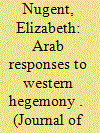

|
|
|
|
|
| Summary/Abstract |
Scholars have long held that Islamism—defined as a political ideology that demands the application of Islamic holy law and the deepening of religious identity—is in part a response to Western domination of Muslim lands. Drawing on the literatures on nationalism and international relations theory, we argue that Islamism is one of a menu of options that Muslims may adopt in response to Western hegemony—a menu that includes Arab nationalism and pro-Western accommodation. We hypothesize that a Muslim’s ideological response to Western domination is a function of the type of domination experienced—that is, military, cultural, or economic—as well as of individual-level characteristics such as intensity of religious practice. We test this hypothesis with a nationally representative survey experiment conducted in Egypt. We find that, among subjects in our study, pro-Western responses to Western domination were more common than “Islamist” or “nationalist” ones and that these were particularly driven by reminders of the West’s economic ascendancy. These findings suggest that foreign domination does not always yield defensive responses and often produces desires for greater cooperation with the hegemon.
|
|
|
|
|
|
|
|
|
|
|
|
|
|
|
|
| 2 |
ID:
157903
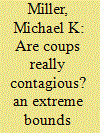

|
|
|
|
|
| Summary/Abstract |
Protests and democratic transitions tend to spread cross-nationally. Is this true of all political events? We argue that the mechanisms underlying the diffusion of mass-participation events are unlikely to support the spread of elite-led violence, particularly coups. Further, past findings of coup contagion employed empirical techniques unable to distinguish clustering, common shocks, and actual diffusion. To investigate which events diffuse and where, we combine modern spatial dependence models with extreme bounds analysis (EBA). EBA allows for numerous modeling alternatives, including diffusion timing and the controls, and calculates the distribution of estimates across all combinations of these choices. We also examine various diffusion pathways, such as contagion among trade partners. Results from nearly 1.2 million models clearly undercut coup contagion. In comparison, we confirm that more mass-driven political events robustly spread cross-nationally. Our findings contribute to studies of political conflict and contagion, while introducing EBA as an effective tool for diffusion scholars.
|
|
|
|
|
|
|
|
|
|
|
|
|
|
|
|
| 3 |
ID:
157901
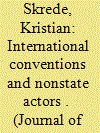

|
|
|
|
|
| Summary/Abstract |
Whether international humanitarian norms are respected during and after civil conflict depends on the behavior of both governments and nonstate actors (NSAs). However, international conventions on the protection of civilians generally do not address NSAs, as such conventions are open only to the representatives of states. In a pioneering initiative, the nongovernmental organization Geneva Call has started to address this problem by soliciting NSAs to sign “deeds of commitment” to ban particular activities violating humanitarian norms. Focusing on the case of antipersonnel mines, we examine why NSAs would choose to sign conventions that limit their autonomy, and whether such conventions can change the behavior of governments and nonstate armed groups. We propose a game-theoretic model of how the interaction between governments and NSAs shape their incentives to commit to and comply with international humanitarian norms. Our empirical evidence highlights the importance of these interdependencies between governments and NSAs in the realm of humanitarian engagements.
|
|
|
|
|
|
|
|
|
|
|
|
|
|
|
|
| 4 |
ID:
157904
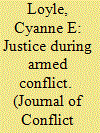

|
|
|
|
|
| Summary/Abstract |
While armed conflict is ultimately about violent interaction between combatant groups, a variety of policies are pursued in conjunction with violence that contribute to the course of conflict and its outcomes. One underdeveloped area of research is the use of judicial and quasi-judicial processes during armed conflict. These processes, including trials, truth commissions, reparations, amnesties, purges, or exiles, are directly related to the actions and abuses of the conflict itself—a phenomenon we refer to as during-conflict justice (DCJ). To enable researchers to answer questions about when and why governments and rebels resort to these strategies, and to what effect, we created a global, cross-national dataset which includes 2,205 justice processes implemented during 204 internal armed conflicts between 1946 and 2011. Using these data, this article investigates the conditions under which governments and rebels employ DCJ as well as the potential effects of DCJ usage on conflict dynamics and outcomes.
|
|
|
|
|
|
|
|
|
|
|
|
|
|
|
|
| 5 |
ID:
157900
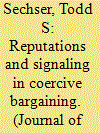

|
|
|
|
|
| Summary/Abstract |
When do states defend their reputations? States sometimes pay high costs to protect their reputations, but other times willingly tarnish them. What accounts for the difference? This article investigates reputation building in the context of coercive diplomacy. In coercive bargaining, giving in to a challenge can harm one’s reputation. I argue, however, that states value their reputations less—and therefore are more willing to capitulate to coercive threats—when they do not expect future challenges. Using a data set of more than 200 coercive threats, empirical tests find support for this logic. Coercers that are constrained in their ability to initiate future challenges exhibit higher rates of coercive success in the status quo. The results shed light on the causes of reputation-building behavior and add an important element to our understanding of the dynamics of coercive diplomacy.
|
|
|
|
|
|
|
|
|
|
|
|
|
|
|
|
| 6 |
ID:
157899
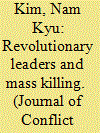

|
|
|
|
|
| Summary/Abstract |
This article argues that revolutionary leaders are more willing to commit mass killing than nonrevolutionary leaders. Revolutionary leaders are more ideologically committed to transforming society, more risk tolerant, and more likely to view the use of violence as appropriate and effective. Furthermore, such leaders tend to command highly disciplined and loyal organizations, built in the course of revolutionary struggles, that can perpetrate mass killing. This study uses time series cross-sectional data from 1955 to 2004 to demonstrate that revolutionary leaders are more likely to initiate genocide or politicide than nonrevolutionary leaders. The violent behaviors of revolutionary leaders are not limited to the immediate postrevolutionary years but also occur later in their tenure. This demonstrates that the association of revolutionary leaders and mass killing is not simply indicative of postrevolutionary instability. This article also provides evidence for the importance of exclusionary ideologies in motivating revolutionary leaders to inflict massive violence.
|
|
|
|
|
|
|
|
|
|
|
|
|
|
|
|
| 7 |
ID:
157897


|
|
|
|
|
| Summary/Abstract |
Conflicting theories and mixed empirical results exist on the relationship between ethnic diversity and trust. This article argues that these mixed empirical results might be driven by contextual conditions. We conjecture that political competition could strengthen ethnic saliency and, in turn, salient ethnic identities can activate or intensify in-group trust and depress trust in members of other ethnic groups. We test this conjecture using the move toward secession in Catalonia, Spain. We conduct trust experiments across ethnic lines in Catalonia before and during the secessionist process. After three years of proindependence mobilization in Catalonia, one of the ethnic groups, Spanish speakers living in Catalonia, has indeed increased its in-group trust. This result is robust after a set of individual-level variables are controlled for, but no equivalent result is found in a comparable region, the Basque Country.
|
|
|
|
|
|
|
|
|
|
|
|
|
|
|
|
| 8 |
ID:
157902


|
|
|
|
|
| Summary/Abstract |
A prominent theory holds that groups may use terrorism in order to provoke governments into undertaking repression that alienates the population. However, virtually no studies have addressed the central puzzle of this provocation logic: why states would actually fall into this trap, if doing so can backfire. This study seeks to address this puzzle by suggesting conditions under which states would respond to terrorism with repression. I argue that states with limited bureaucratic capacity are more prone to using repression after terrorist incidents, as their ability to selectively crack down is inhibited by their more limited capability for controlling, monitoring, and collecting revenue from their populations and for collecting intelligence on suspected terrorists. Using a cross-national analysis with data from 1981 to 2011, I find it is low-capacity states which are most likely to respond to terrorism with repression, while constraints on executive authority have no clear effect.
|
|
|
|
|
|
|
|
|
|
|
|
|
|
|
|
|
|
|
|
|